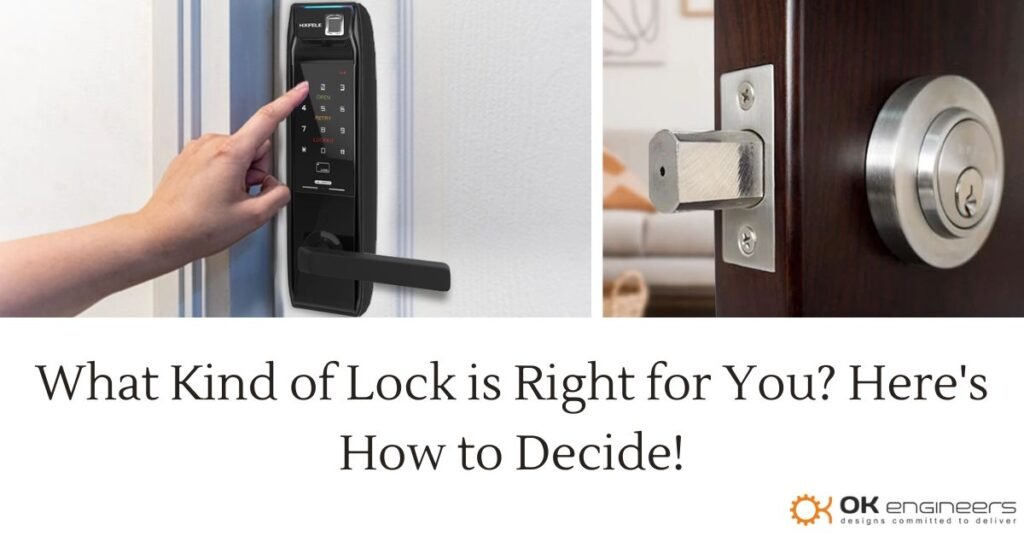Introduction
Choosing the right lock for your home or office is a crucial decision that can significantly affect your security and peace of mind. With so many different types of locks available, how do you know which one is right for you? This article will guide you through the process of selecting the perfect lock by explaining the different types of locks, their features, and how to match them to your specific needs.
Understanding the Importance of Choosing the Right Lock
Security is a top priority for any home or office. The lock you choose acts as the first line of defense against intruders, so picking the right one matters more than you think. It’s not just about grabbing the first lock you see at the store; it’s about finding one that suits your environment, provides the level of security you need, and is easy to use.
Security vs. Convenience
When choosing a lock, there is often a trade-off between security and convenience. High-security locks might take more time to open or require a more complex key, while convenient locks, like electronic or smart locks, might offer more ease of access but at the potential cost of reduced security.
Factors to Consider Before Choosing a Lock
Before buying a lock, you need to consider several factors:
- The type of door (interior or exterior)
- The security level needed
- How frequently the door is used
- The weather conditions (for outdoor locks)
- Whether the lock is for a residential or commercial setting
Types of Locks Available in the Market
Now that you know why choosing the right lock is important, let’s explore the different types of locks available.
Deadbolts
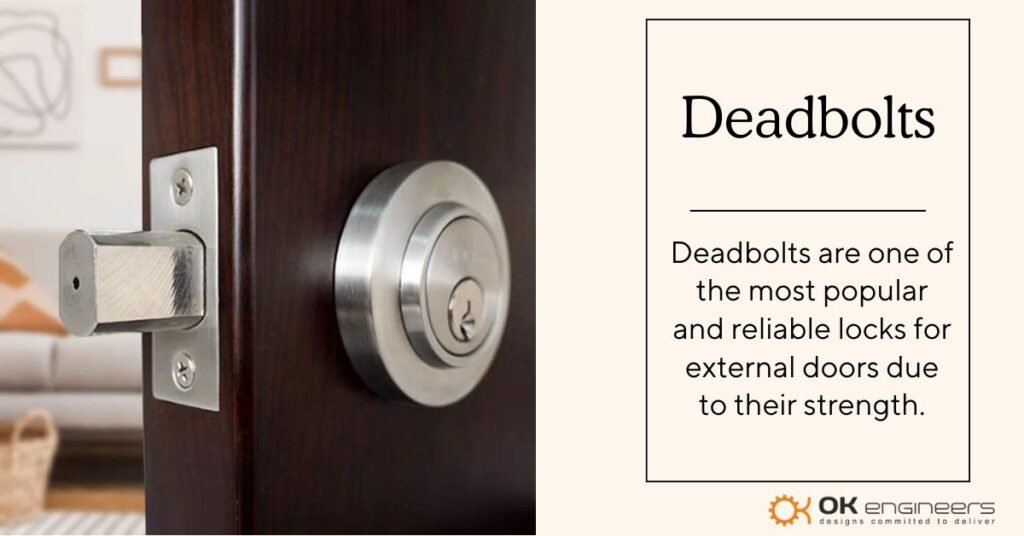
Deadbolts are one of the most popular and reliable locks for external doors due to their strength.
Single Cylinder Deadbolt
The single-cylinder deadbolt uses a key on the outside and a thumb turn on the inside. This is ideal for doors that don’t have windows nearby, preventing easy access to the inside thumb turn.
Double Cylinder Deadbolt
This version requires a key on both sides, adding extra security for doors with glass panels, as an intruder can’t break the glass and turn the lock from the inside.
Knob Locks
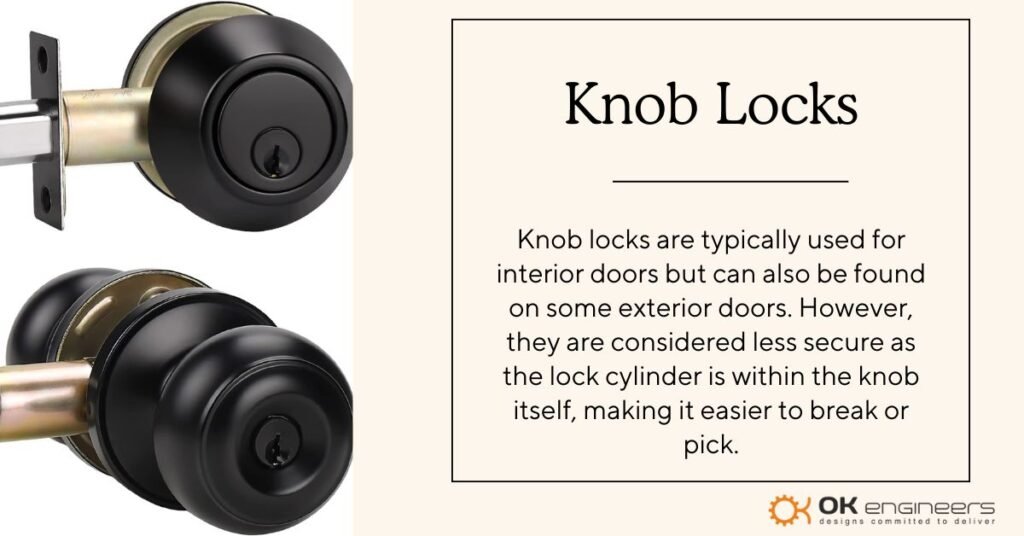
Knob locks are typically used for interior doors but can also be found on some exterior doors. However, they are considered less secure as the lock cylinder is within the knob itself, making it easier to break or pick.
Lever Handle Locks
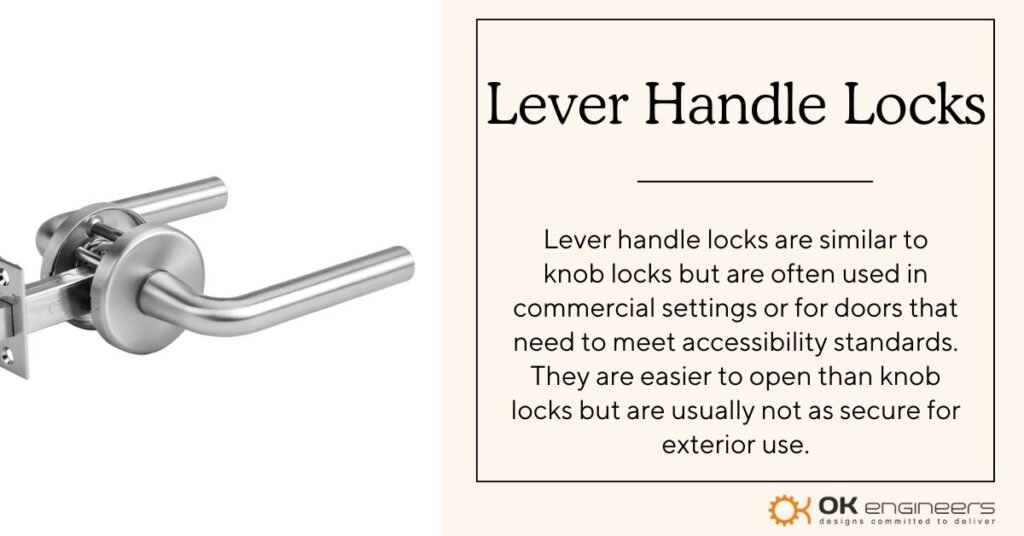
Lever handle locks are similar to knob locks but are often used in commercial settings or for doors that need to meet accessibility standards. They are easier to open than knob locks but are usually not as secure for exterior use.
Electronic Locks
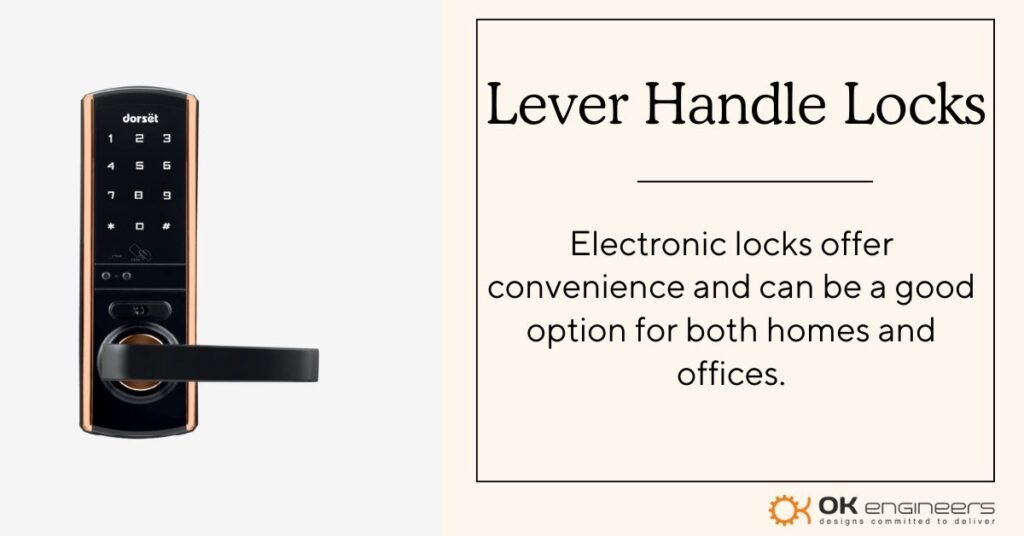
Electronic locks offer convenience and can be a good option for both homes and offices.
Keypad Locks
These locks require a code to enter. They eliminate the need for keys, but the code must be kept secure to maintain high security.
Smart Locks
Smart locks connect to your phone or a smart home system, allowing you to lock and unlock your door remotely. While convenient, they come with a risk of being hacked.
Mortise Locks
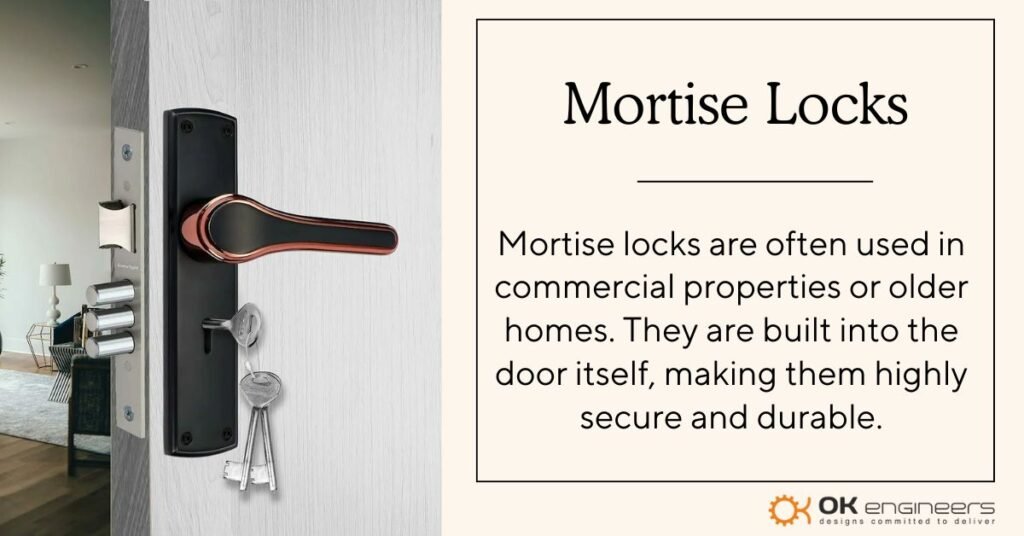
Mortise locks are often used in commercial properties or older homes. They are built into the door itself, making them highly secure and durable.
Rim Locks
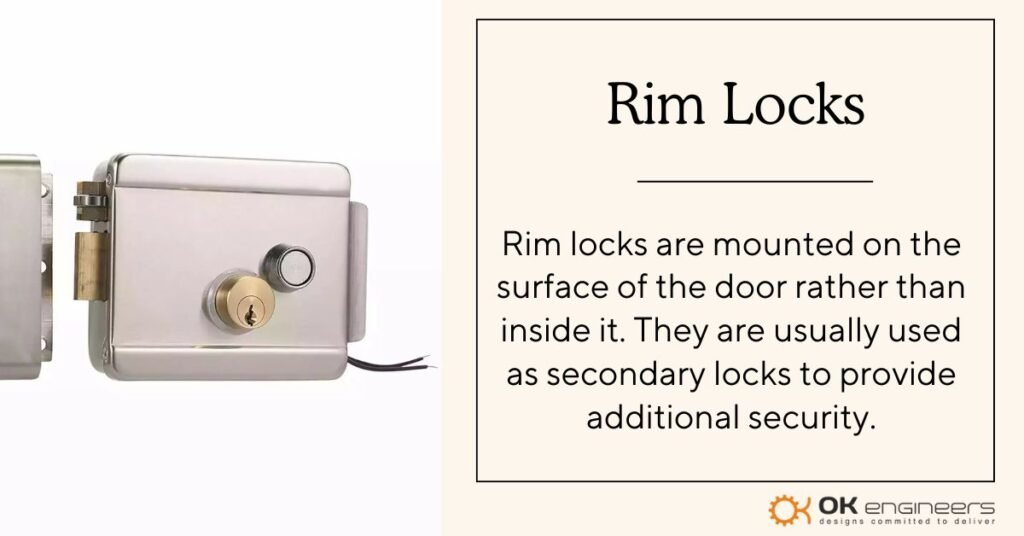
Rim locks are mounted on the surface of the door rather than inside it. They are usually used as secondary locks to provide additional security.
Padlocks
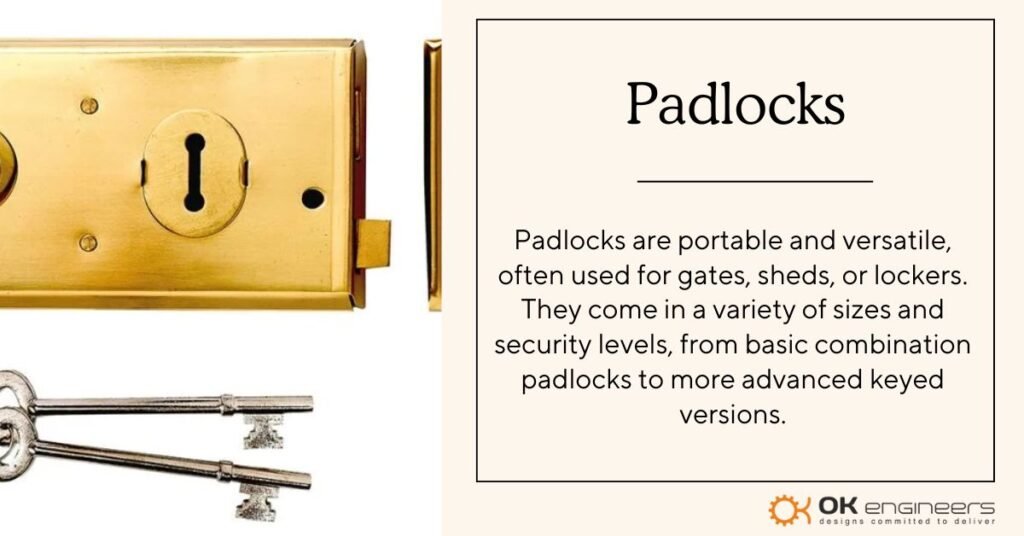
Padlocks are portable and versatile, often used for gates, sheds, or lockers. They come in a variety of sizes and security levels, from basic combination padlocks to more advanced keyed versions.
Combination Locks
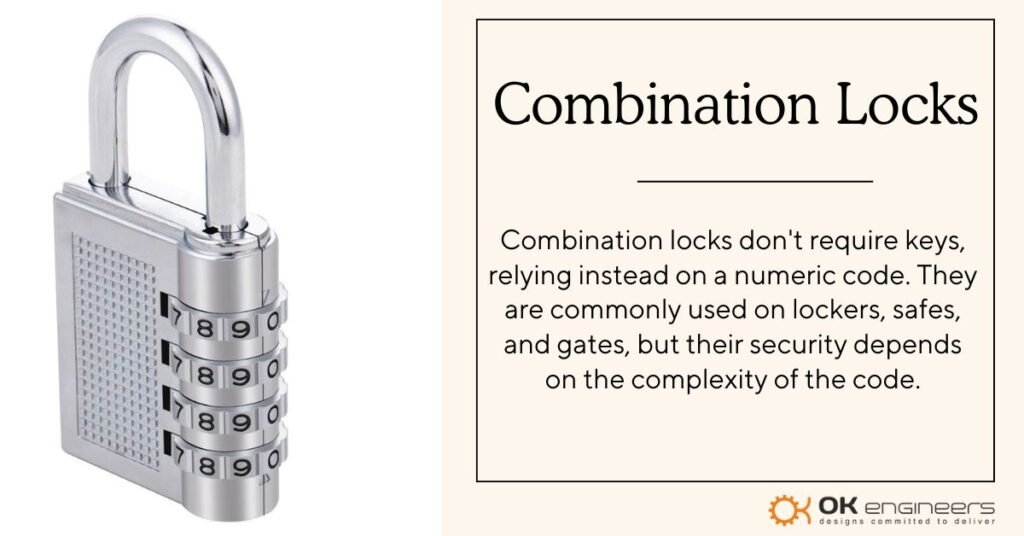
Combination locks don’t require keys, relying instead on a numeric code. They are commonly used on lockers, safes, and gates, but their security depends on the complexity of the code.
How to Choose the Right Lock for Your Home or Office
Choosing the right lock requires more than just picking the strongest one available. You need to consider the specific needs of your home or business.
Assess Your Security Needs
If you live in a high-crime area or need to protect valuable assets, opting for a high-security lock like a deadbolt or biometric lock is essential. For less sensitive areas, a basic knob lock or lever handle lock may suffice.
Match the Lock Type to the Location
Exterior doors need stronger locks like deadbolts, while interior doors can have simpler options like knob or lever locks. Consider the environment of the door when making your decision.
Consider Ease of Use
Locks that are difficult to open, like double-cylinder deadbolts, may be secure but can also be inconvenient in an emergency. Think about how often you’ll need to use the lock and in what situations.
Durability and Weather Resistance
For outdoor locks, choose one that is resistant to weather conditions like rain or extreme temperatures. Stainless steel or brass locks are more durable and resistant to corrosion.
Specialized Locks for Added Security
Biometric Locks
Biometric locks use fingerprint or facial recognition technology to provide access. They offer high security and are often used in high-end homes and commercial properties.
High-Security Locks
High-security locks come with advanced features like drill resistance, anti-pick pins, and additional locking mechanisms, making them nearly impossible to tamper with.
The Role of Aesthetics in Choosing Locks
While security is a priority, aesthetics also play a role in lock selection, especially for residential properties.
Matching Locks to Door Styles
Consider the style of your door when choosing a lock. Sleek, modern locks may suit a contemporary home, while more ornate locks might be better for traditional homes.
Lock Finishes and Design
Locks come in a variety of finishes such as brass, chrome, or matte black. The finish you choose should complement the rest of your hardware for a cohesive look.
Budget Considerations for Lock Choices
Cost vs. Quality
While it’s tempting to choose a cheaper lock, investing in a high-quality one can save you from potential break-ins and future replacement costs.
Conclusion
Choosing the right lock involves balancing security, convenience, aesthetics, and budget. Whether you’re securing a home, office, or another property, the type of lock you choose plays a key role in your overall safety. By understanding the different types of locks available and assessing your specific needs, you can confidently select the lock that’s right for you.
FAQs
What is the most secure type of lock?
Deadbolts, especially double-cylinder deadbolts and high-security locks, are considered some of the most secure options.
Can electronic locks be hacked?
While it’s rare, electronic and smart locks can be vulnerable to hacking if not properly secured.
How do I maintain my lock for longevity?
Regular cleaning, lubricating moving parts, and ensuring that the lock is installed correctly can help maintain its longevity.
What is the difference between a deadbolt and a knob lock?
Deadbolts offer more security as they are harder to break or pick, while knob locks are easier to use but offer less protection.
Are smart locks safe for homes?
Smart locks can be safe if they come with strong encryption and are used with secure apps and practices. However, they do have some risk of hacking.
You may also like : Brass Lamp Parts, Brass Lamp Components, Brass Lock Nuts Manufacturer, Brass Reducers Manufacturer

